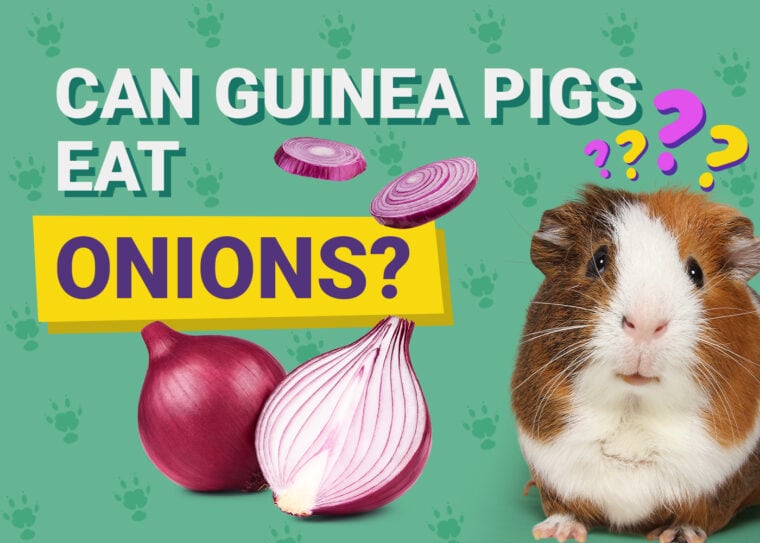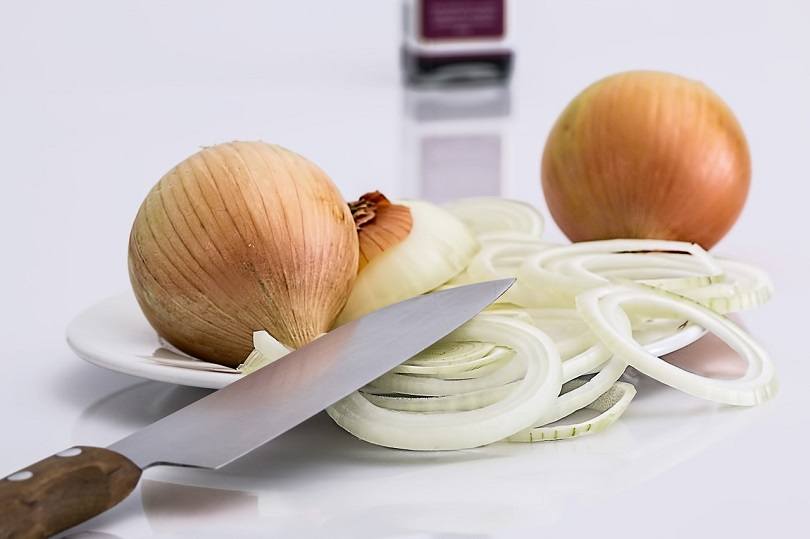
Click to Skip Ahead
Guinea pigs are fantastic pets and provide their owners with joy through their curious antics. At times, they may even show an interest in what you eat, inquisitively sniffing around and showing interest in various human foods.
Though many people know that guinea pigs are herbivores, it is important to remember that not all plants and herbs are safe for their consumption. Onion is toxic for guinea pigs and should not be offered to them in any amount.
Read on as we explain why guinea pigs should not be offered onion.
Why Are Onions Bad for Guinea Pigs?
Onions, along with garlic, chives, leeks, and shallots, belong to the Allium family of plants. All these plants naturally have compounds that contain sulfur-containing oxidants. These compounds are released whenever the plant is broken down; this can occur as they’re chewed or as they are broken down by the digestive system.
Once released, these compounds are absorbed into the bloodstream, where they are able to destroy red blood cells. Red blood cells are responsible for transporting oxygen from the lungs to the rest of the body and carrying carbon dioxide from the body back to the lungs to be exhaled.
The rapid destruction of red blood cells is what makes these plants so toxic for your guinea pig (and many other pets). This makes onions dangerous for guinea pigs in any quantity, and they should not be offered onion—including onion flakes or powders. In addition, any food containing onion should not be offered to your guinea pig (as a general rule, processed human foods should not be offered to guinea pigs).

Signs of Onion Toxicity
The most drastic signs of onion toxicity occur roughly three days after onion has been ingested; however, depending on the amount, they may occur in as little as a day after its consumption.
Left untreated, death is a possibility. Therefore, it is important to rush your guinea pig to a veterinarian if they’ve eaten any amount of onion, even before the signs appear.
How Onion Toxicity Is Treated
Your veterinarian will assess your guinea pig’s level of toxicity by looking at their signs and examining their blood under a microscope, if necessary.
Though veterinarians can help animals that have recently ingested onions by inducing vomiting, they cannot do so in guinea pigs. This is because guinea pigs cannot vomit. Therefore, all treatment your veterinarian will administer is supportive therapy to help your guinea pig. This includes oxygen therapy, blood transfusions, IV fluids, and other medication as needed. There is no antitoxin for onion toxicity.
Prevention Tips
The best way to avoid the heartache of an onion’s toxicity and the potential loss of a beloved pet is to keep onions away from your guinea pig, and ensure that nobody in your house feeds them unsafe foods. Children should be monitored when they’re around pets to ensure that they don’t inadvertently feed them anything that’s potentially harmful to them.
As mentioned above, many processed foods contain onion in other forms (such as a seasoning or a powder). As a rule of thumb, guinea pigs should not be offered any processed human foods. Doing so ensures that they don’t accidentally consume onion.
Other Foods to Avoid
In addition to onion, garlic, chives, leeks, and shallots, here are other foods you should avoid giving your guinea pig:

Conclusion
Though guinea pigs are herbivores, there are certain plants and herbs they should not be fed under any circumstances. Onions are toxic for guinea pigs and onion consumption should be considered a medical emergency that requires immediate veterinary care.
In order to ensure your guinea pig is fed the correct foods and offered the best nutrition possible, you should consult with your veterinarian about their dietary requirements to ensure that your beloved guinea pig eats what is appropriate for them.
Featured Image Credit: Couleur, Pixabay








